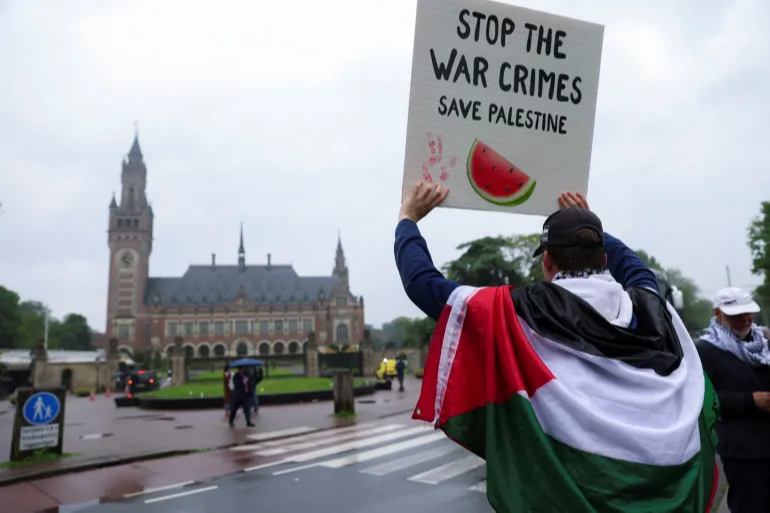
Photo outside the ICJ after ruling that Israel's occupation is illegal
A protester draped in a Palestinian flag holds up a sign in solidarity with Gaza outside the International Court of Justice in The Hague, Netherlands, on May 24, 2024 [Johanna Geron/Reuters]
Ramallah, July 20 (RHC)-- Activists and legal experts in the West Bank say Friday’s ruling by the International Court of Justice (ICJ), which has found that Israel’s occupation of the Palestinian territories is unlawful, will do little to improve life for Palestinians.
Other states must now apply collective pressure on Israel to end its rule over Gaza and the West Bank, including annexed East Jerusalem, if the situation there is to change, they say.
The world’s highest court concluded on Friday – with 12-3 judges in favour – that Israel is forcibly displacing Palestinians from their lands, exploiting water sources, annexing large swaths of the occupied territory “by force” and is violating the right of Palestinians to “self-determination.”
The ICJ also ruled that Israel must stop all building of settlements in the West Bank and should compensate Palestinians for human rights violations in the occupied territory. The ruling is a non-binding advisory opinion, which was sought by the United Nations General Assembly in 2022, seeking to clarify the legal implications of Israel’s occupation of the West Bank.
The ICJ called on the UN – especially the Security Council and General Assembly – to take action to bring Israel’s unlawful occupation to a “rapid” end.
However, Zainah el-Haroun, the spokesperson for Al-Haq, a Palestinian nonprofit organisation based in the West Bank that monitors human rights violations, said previous ICJ rulings have not led to global action against Israel.
She referenced the ICJ’s 2004 advisory opinion that found Israel’s separation wall and settlements on occupied Palestinian land illegal. Settlements have not only remained in the West Bank since the ruling, but the number of Israeli settlers living there has also risen from 250,000 in 1993 to more than 700,000 in 2023. “These rulings mean nothing if third states and the international community fail to hold Israel accountable,” she told Al Jazeera.
“The ICJ has ruled that Israel’s occupation is unlawful and must end immediately. Third states must ensure the full and total realisation of the Palestinian people to self-determination and sanction Israel’s illegal occupation, which breaches international law,” she added.
Palestinian activists in the West Bank said they cannot celebrate the ICJ’s ruling when the situation across the occupied territory is worse than ever before. They cited Israel’s war in Gaza, which has killed at least 38,848 Palestinians – the vast majority of them civilians – and has rendered the enclave uninhabitable. Gaza is also witnessing an outbreak of diseases such as polio and cholera while nearly the entire population is struggling to survive food shortages brought on by Israel’s siege of the enclave.
Israel’s war on Gaza followed Hamas-led attacks on military outposts and communities in southern Israel on October 7, in which 1,139 people were killed and 251 taken captive.
The global attention – and shock – over Israel’s war ever since has distracted attention from its settlement expansion in the West Bank, observers said. “A year ago, a ruling like this would have been great. We all would have thought this was a great step forward,” said Tasame Ramadan, a human rights activist from the West Bank city of Nablus. “But right now, the priority is a permanent ceasefire [in Gaza] and an end to the occupation.”
Mohamad Alwan, a Palestinian rights activist monitoring settler attacks in the West Bank, expressed a similar wariness about what the ruling will mean on the ground. He said that while he recognises the ruling hurts Israel’s image abroad, there is no way for the court to apply or enforce it.
In addition, Alwan said he is pessimistic about whether states will take action against Israel after the ruling. He cited perceived indifference to the ICJ’s binding order in January, in which the court called on Israel to scale up aid and prevent further harm to civilians in Gaza after concluding that “the rights of Palestinians were at risk” under the Genocide Convention.
“In my opinion, this decision will have no immediate impact on the situation on the ground,” he told Al Jazeera. “However, in the long run, there might be an impact. The world has seen now how Israel kills people and kills children, and their views are changing about Israel and its occupation.”
Palestinian activists stressed that the ICJ’s advisory ruling on Friday must be understood in the context of the Nakba, or “Catastrophe”, of 1948 when Zionist militias expelled about 750,000 Palestinians from their lands to create the state of Israel.
Diana Buttu, a Palestinian legal expert, said she wished the ICJ had referenced the Nakba to highlight the historic pattern of Israel’s behaviour in the occupied territory. “While I’m happy about the outcome of this case, I also think that this focus just on the West Bank and Gaza ignores the bigger picture of the origins of this situation and the ways in which Israel was created, which was through the ethnic cleansing of Palestinians,” Buttu told Al Jazeera.
“The Nakba is where this all started. How can we not mention the cause of the issue and where this all started? This is not the right way to address an issue like this,” she said. “We would definitely like to see the international community recognise the Nakba, recognise all the people we lost in 1948 and to recognise the consequences of the Nakba that we are still living through today.”

